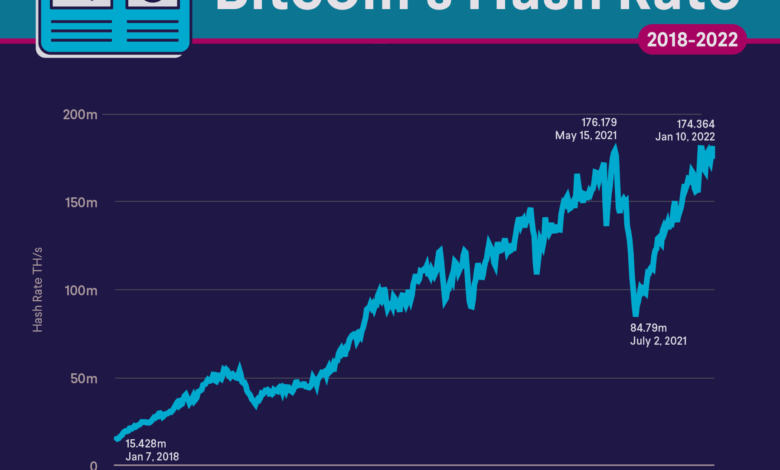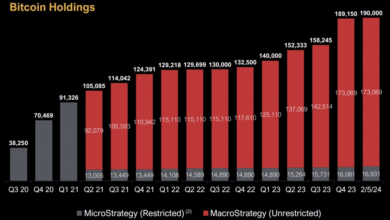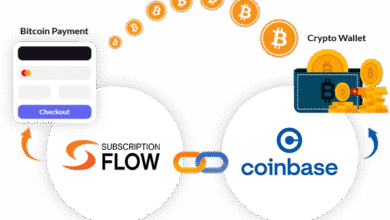Bitcoin Hashrate Hits Record High Amid Rising Prices

Bitcoin’s hashrate has become a focal point in the cryptocurrency landscape, steadily climbing as the network approaches unprecedented levels. Recently, the surge of 40 exahashes per second (EH/s) has propelled the total hashrate to an impressive 836 EH/s, nearing historical records. This rise in hashrate correlates with increasing Bitcoin prices, resulting in a favorable hashrate increase that enhances Bitcoin miners’ earnings. As operational efficiency improves, miners are better positioned to tackle network difficulty adjustments and adapt to the rapidly changing market. With these dynamics at play, understanding Bitcoin’s hashrate becomes essential for anyone looking to grasp the trends in Bitcoin mining and its impact on the broader cryptocurrency economy.
The computational power dedicated to Bitcoin operations, often referred to as the Bitcoin hashrate, has been gaining significant attention within the digital asset space. This growing processing capability not only influences the profitability of Bitcoin miners but also signals broader shifts in market conditions. With recent trends showcasing how Bitcoin mining efforts are affected by fluctuations in Bitcoin price and network difficulty adjustments, the landscape is clearly evolving. Additionally, advancements in technology and mining equipment play a crucial role in bolstering hashrate and optimizing miner output. Thus, a comprehensive understanding of the increasing hashrate is vital for stakeholders invested in the financial future of Bitcoin.
Understanding Bitcoin Hashrate Dynamics
The hashrate is a pivotal metric in the Bitcoin mining ecosystem, representing the total computational power used to mine and process transactions on the network. Recently, Bitcoin’s hashrate has seen substantial growth, reaching a staggering 836 EH/s, which is nearing its all-time high. This surge is primarily driven by an increase in Bitcoin’s price, which incentivizes more miners to participate in the network. As more miners join the fray, they contribute to the overall hashrate, effectively making the network more secure while also influencing the relative difficulty of mining new blocks.
The correlation between Bitcoin’s price and hashrate underscores an important relationship in the world of cryptocurrency. When Bitcoin prices rise, more miners are drawn into the market, thus fueling the hashrate increase. This has a cascading effect: not only does it enhance network security, but it also raises the computational difficulty of mining. As a result, miners must continuously innovate and upgrade their technology to remain profitable. This dynamic is an essential element for understanding current market trends and the future of Bitcoin mining.
The Impact of Bitcoin Price on Miner Earnings
As Bitcoin’s price fluctuates, it directly impacts miner earnings and operational strategies. The recent increase in the hashprice, a measure of the monetary gain derived from one petahash of hashing power, has brought a much-needed relief for miners. From a valuation of $46.21 per petahash just a week prior, this has jumped to $49.57, indicating that Bitcoin miners might see improved earnings just as their network struggles with tight margins. Such fluctuations in miner profitability are crucial for sustaining operations, particularly when mining difficulty rates adjust in response to changes in the network hashrate.
For Bitcoin miners, the correlation between price increases and earnings is clear. As transaction fees currently make up a minor portion of total earnings, their revenue relies heavily on Bitcoin’s market value. Consequently, miners are compelled to adapt to shifting market dynamics, whether that means upgrading hardware or re-evaluating their operational costs. With a projected continuous rise in Bitcoin price, miners are likely to experience enhanced profit margins—though they must remain vigilant and agile to avoid potential pitfalls associated with rising network difficulty.
Navigating Mining Challenges Amid Rising Hashrate
Amidst the unprecedented rise in Bitcoin’s hashrate, miners face not only increased computational challenges but also the pressures of a fluctuating market environment. With the network gaining an additional 40 EH/s over a short period, the mining difficulty has also escalated, currently set at 113.76 trillion. This slight increase is indicative of the challenges miners encounter as they must now invest in more powerful hardware and efficient operations to maintain profitability. This environment necessitates careful strategy planning and an acute awareness of mining dynamics to survive the competitive landscape.
As miners adapt to these conditions, they must also account for the operational costs that have significant implications for their earnings. The recent upward adjustment in Bitcoin’s price has, to some extent, counterbalanced the increasing difficulty, but profit margins remain precarious. Moreover, miners should monitor blockchain activity and transaction fees, as even their modest contribution can be vital during periods of heightened network demand. The ability to innovate and enhance operational efficiency will be critical for miners aiming to thrive in an escalating market environment characterized by rising hashrates and dynamic network conditions.
The Role of ASIC Hardware in Mining Efficiency
Advancements in application-specific integrated circuit (ASIC) technology have played a significant role in enhancing mining efficiency, allowing Bitcoin miners to significantly increase their output levels. The latest generation of ASIC miners boasts incredible processing power, which helps miners maintain competitive advantages in an increasingly tough environment. As hashrates climb toward historic high territories, leveraging strong ASIC technology has become essential for miners to ensure profitability amid rising operational difficulty.
Investing in state-of-the-art ASIC hardware enables miners to process transactions more rapidly and efficiently, which is vital as the Bitcoin network grapples with scaling challenges. As the market grows and evolves, miners with superior hardware solutions will benefit from lower energy costs and improved computational speeds, thus maximizing their potential earnings. Consequently, the race to upgrade to the latest ASIC machines is fundamental to navigating the volatile market conditions while closely monitoring Bitcoin prices and hashrate trajectories.
Future Trends in Bitcoin Mining Operations
The future of Bitcoin mining operations is poised for significant developments, influenced by numerous factors such as technological advancements, regulatory changes, and market dynamics. Given the current increase in hashrate, miners must remain proactive and adaptable, implementing strategies that can accommodate potential shifts in Bitcoin’s price and network difficulty. For instance, transitioning to renewable energy sources may emerge as a core strategy for many mining operations, allowing them to mitigate electricity costs while staying environmentally compliant.
As Bitcoin continues to approach its historical hashrate peak, attention will likely shift to sustainability and efficiency in mining processes. This trend may catalyze the evolution of new mining methodologies and business models that prioritize profitability even during market downturns. Miners that embrace innovative practices and tools—such as better cooling systems, automation, and optimized hardware—will likely be better positioned to weather future financial challenges while contributing effectively to the overall stability of the Bitcoin network.
Financing Strategies for Bitcoin Miners
As market conditions change, Bitcoin miners need effective financing strategies to sustain their operations and capitalize on profitable opportunities. With the rise in hashrate and corresponding mining difficulty, securing adequate funding for hardware upgrades, operational expenses, and energy costs becomes increasingly critical. Miners could explore various avenues, such as partnerships or investment from private equity, to ensure they can afford the latest technology and remain competitive in the landscape.
In addition to seeking external funding, optimizing cash flow management is paramount for miners navigating this volatile market. Establishing strong relationships with energy providers and diversifying energy procurement strategies can help mitigate risks associated with fluctuating operational costs. Furthermore, miners should also consider leveraging financial products or services tailored for cryptocurrency operations, thus enhancing their leverage in the marketplace and ensuring their capacity for adaptation to rapid market changes.
Analyzing the Correlation Between Hashrate and Market Valuation
A deeper analysis of the relationship between Bitcoin hashrate and market valuation reveals insightful patterns that can guide miners’ decision-making processes. Historically, surges in Bitcoin’s price have coincided with increases in network hashrate, as miners are encouraged to contribute more resources in the hopes of higher earnings. Understanding these correlations can empower miners to make informed choices on when to expand operations, invest in technology, or even exit the market.
Moreover, as Bitcoin valuation becomes increasingly intertwined with hashrate trends, miners must maintain a comprehensive understanding of external factors that can sway this dynamic. Various market indicators, from regulatory developments to broader economic indicators, can directly impact investor sentiment and, subsequently, Bitcoin’s price trajectory. By staying attuned to these macroeconomic trends, miners can better position themselves to adapt quickly and seize opportunities before their competitors do.
The Importance of Network Difficulty Adjustments in Mining
Network difficulty adjustments are a crucial element of Bitcoin mining that affect miner earnings and overall network stability. As more miners join the network, increasing the hashrate, the difficulty of mining new blocks adjusts to ensure that blocks are created at an average rate of one every ten minutes. This inherent mechanism preserves the integrity of the blockchain, balances miner rewards, and reinforces the decentralized nature of the network.
For miners, understanding the intricacies of difficulty adjustments can directly influence their profitability and operation strategies. When a significant increase in hashrate occurs, miners may notice a short-term drop in earnings due to heightened competition and tougher mining conditions. As such, analyzing these difficulty fluctuations, alongside Bitcoin price movements, becomes essential for making operational decisions and anticipating market changes, ultimately shaping overall mining profitability.
Market Sentiment and Its Effects on Mining Decisions
Market sentiment plays an impactful role in guiding the decisions Bitcoin miners make, particularly during periods of heightened volatility. When positive sentiment prevails—typically marked by rising Bitcoin prices—miners tend to feel optimistic about investing in new equipment and expanding their operations. Conversely, in bearish periods, sentiment influences retrenchment, urging miners to reduce output or halt operations altogether due to diminishing returns.
Furthermore, sentiment not only affects individual mining operations but can also ripple through the entire network. A collective sense of uncertainty can lead to fluctuating hashrate levels, reflecting hesitance from miners regarding their engagement with the Bitcoin network. Thus, monitoring market sentiment and understanding its impact on miner behavior is essential for any player in the crypto ecosystem looking to maintain a sustainable operation amidst constant change.
Frequently Asked Questions
What is the current Bitcoin hashrate and how does it affect mining profits?
As of March 25, 2025, the Bitcoin hashrate has reached 836 EH/s, approaching its historical peak. This increase in hashrate leads to higher mining profits, as seen in the rise of the hashprice from $46.21 to $49.57 per petahash per day. The relationship between hashrate and profitability means that as more miners contribute power, earnings per unit of power can fluctuate based on network difficulty and Bitcoin’s price.
How does Bitcoin mining difficulty influence the hashrate?
Bitcoin mining difficulty directly impacts the hashrate. A recent 1.43% difficulty adjustment occurred on March 23, 2025, as the network increased its hashrate from 796 EH/s to 836 EH/s. Higher difficulty means miners must provide more computational power to solve blocks and earn Bitcoin, which can lead to increased competition among miners as they adapt their operations.
What role does Bitcoin price play in hashrate changes?
The price of Bitcoin significantly influences changes in hashrate. As Bitcoin’s price rises, miners are incentivized to increase their hashrate to maximize profits. This correlation is evident in recent trends, where a surge in Bitcoin price has corresponded with a higher hashrate, suggesting that miners are calibrating their efforts based on potential earnings.
What are the implications of a rising Bitcoin hashrate for new miners?
A rising Bitcoin hashrate can present challenges for new miners. Increased competition may mean tighter margins as more miners enter the space. Additionally, the adjustment of mining difficulty in response to higher hashrates can affect profitability, making it crucial for new miners to invest in efficient hardware and understand market dynamics.
How do transaction fees impact Bitcoin miners’ earnings compared to hashrate?
While the hashrate is vital for miner earnings, transaction fees currently play a minor role. As of now, transaction fees account for only 2.14% of total earnings, indicating that Bitcoin miners’ profitability is largely driven by the price of Bitcoin and the hashrate, not transaction fees. As the hashrate increases, the overall competition among miners can reduce fees, further affecting earnings.
| Key Point | Details |
|---|---|
| Bitcoin Hashrate | Currently at 836 EH/s, nearing an all-time high due to price increases. |
| Hashprice Increase | Estimated daily earnings per petahash increased from $46.21 to $49.57. |
| Network Activity | 48,116 unconfirmed transactions noted in the mempool, indicating higher engagement. |
| Transaction Fees | Currently at 31 sat/vB, equating to $3.83 for high-priority transfers. |
| Mining Difficulty | Adjusted to 113.76 trillion, just below its historic peak. |
| ASIC Advances | New hardware is contributing to increased hashrate efficiency. |
Summary
Bitcoin hashrate is currently experiencing a remarkable surge, approaching record-breaking levels as rising prices incentivize mining activities. The increases in both hashrate and hashprice indicate a dynamic environment where miners must adeptly balance their operational costs with evolving profitability. As the Bitcoin market fluctuates, these trends highlight the critical nature of understanding market conditions for successful mining operations.




